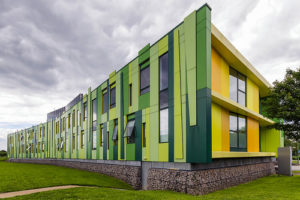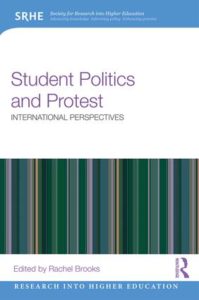 In the literature on higher education, there is an increasing emphasis on the importance of virtual spaces in terms of both pedagogic practice and wider aspects of university life. It has also been argued that online spaces, and social media in particular, are playing a key role in facilitating the political engagement of students. In our research on contemporary students’ unions, however, much greater emphasis was placed by our respondents (students’ union officials and senior institutional managers) upon the physical spaces of the campus than on the virtual spaces available to students and/or students’ union officials for both academic and social activities. Indeed, the students’ union building itself was discussed, at great length, by many of the students’ union officials and senior managers who participated in our focus groups. Several respondents described how changes had recently been made to the buildings used by the students’ union, which, they claimed, had had a positive effect. For senior managers at one of our higher education institutions (HEIs), for example, a shift to a more central location on campus was thought to have had a significant influence on the visibility of the union, and the propensity of others to engage with it:
In the literature on higher education, there is an increasing emphasis on the importance of virtual spaces in terms of both pedagogic practice and wider aspects of university life. It has also been argued that online spaces, and social media in particular, are playing a key role in facilitating the political engagement of students. In our research on contemporary students’ unions, however, much greater emphasis was placed by our respondents (students’ union officials and senior institutional managers) upon the physical spaces of the campus than on the virtual spaces available to students and/or students’ union officials for both academic and social activities. Indeed, the students’ union building itself was discussed, at great length, by many of the students’ union officials and senior managers who participated in our focus groups. Several respondents described how changes had recently been made to the buildings used by the students’ union, which, they claimed, had had a positive effect. For senior managers at one of our higher education institutions (HEIs), for example, a shift to a more central location on campus was thought to have had a significant influence on the visibility of the union, and the propensity of others to engage with it:
It’s much more visible, the [students’ union] is just a much more open place, it’s more centrally located, it’s better connected with other parts of the university. It’s actually a place where people are wanting, not just the students, but people want to do things in it. And I think, so it’s more valued by the university than the temporary place that was there before. And I suppose that, the effect on the student unions it’s just to make its business, its existence much more public…..I think that’s made a big difference because the student union is far more visible, not just for students, but it’s also visible for staff as well.
Similarly, union officials at another HEI claimed that the improvement in the union’s space – making it more open and welcoming – had had a direct impact on its use:
We have had this fantastic space this year, so we have been able to even engage with people that don’t have problems, all they want to do is to find a nice place to sit … To chill out, yeah. … and to play Scrabble and to …. You know the glass front, when you first walked in, that used to be a brick wall with a little window, could knock on and speak to someone in reception in the corridor. So it wasn’t even nice sort of …It was awful.
In these accounts, an emphasis on the materiality of the campus is clearly evident. In particular, the nature and location of the students’ union building is claimed to have a direct impact on the extent to which the wider student body engages (or does not engage) with the union.
Although there is currently little academic research on the role of students’ unions in the UK, a notable exception is that carried by Andersson and colleagues, which analysed the role of the union as part of a broader project that examined ‘geographies of encounter’ between different social groups at a UK HEI. They argue that while, in theory, the students’ union can be seen as a key arena for bringing students from different backgrounds together to pursue a range of social, political and leisure activities, in practice, the increasingly commodified nature of union activity militates against social mixing. Here, they point to the impact of unions letting out space to private enterprises, which then often offer a range of highly-gendered commercial activities (such as beauty salons, hairdressers and nightclubs). The students’ union, in their analysis, is a space in which students from diverse backgrounds are ‘thrown together’ but which does not take the shape of a Habermasian, egalitarian ‘public sphere’; instead it is a space that is heavily mediated by commercial interests, and tends to reinforce some forms of inequality.
Our data, however, suggest a more complex reading of the spaces of students’ union, and a more ambivalent relationship between unions and processes of commodification. Although commercial activities on campus were clearly important to senior managers and were valued by some students’ unions as means of preserving some independence (through having an income stream in addition to the block grant from their institution), in none of our ten case studies were they viewed (either by managers or union officers) as the key focus of the union’s activity. We suggest that market pressures on universities (such as competition with other institutions, and the emergence of various ranking systems) have caused unions to place less emphasis, rather than more, on their commercial activities, which, in turn, has implications for the physical spaces that students’ unions occupy. While HEIs are clearly concerned with revenue generation and ensuring financial sustainability in an increasingly competitive higher education market, the importance of measures of ‘student satisfaction’ in stimulating demand for courses has encouraged senior managers to work closely with their students’ union and, often, to value highly the contributions unions can make to improving the quality of ‘the student experience’ and ensuring ‘the student voice’ is represented effectively.
Such pressures have encouraged unions to foreground their representative function, often at the expense of campaigning activities and also, in many cases, to the detriment of commercial ventures. This has, inevitably, had a direct impact on the use of physical space on campus, with a decline in the number of bars and clubs. The same pressures have also been an important driver of institutional investment in the physical infrastructure of students’ unions – particularly a desire to increase the visibility and use of the union by the wider student body. Indeed, union officers in our research believed they had been ‘rewarded’ by investment in their buildings for their support of university priorities. In some cases, respondents also linked this type of investment to the substantial increase in tuition fees for domestic students in England and Wales from 2012 onwards:
And my view is that the university’s very much aware of the fact that the fees have gone up to £9,000 … and they’re very keen to invest in facilities for students and provide additional resource to support the student experience, and [the union is] very good at actually tailoring their message to sort of like address that particular lead. (Senior managers’ focus group)
Nevertheless, our data indicate that while institutional investment in students’ unions buildings may have had a positive impact on both the use and visibility of union space, it was not always entirely unproblematic. Indeed, some of the factors that had motivated the investment were also those that created tensions. For example, one group of students’ union officers described a struggle over the extent to which the union should look similar to the rest of the university and an insistence by senior management that they should use the same colour schemes and branding. Such tensions provide support for those who have argued that university campuses are often ‘paradoxical spaces’ in which competing, and sometimes contradictory, discourses prevail – in this case, the marketization of higher education appears to have substantially limited students’ unions’ focus on commercial activity.
This post first appeared on the Surrey Sociology blog in August 2016. A fuller account of this research is given in this article.

 Call for Papers: Symposium on ‘Constructing the higher education student: understanding spatial variations’, Royal Geographical Society-Institute of British Geographers Annual Conference, 29th August-1st September 2017
Call for Papers: Symposium on ‘Constructing the higher education student: understanding spatial variations’, Royal Geographical Society-Institute of British Geographers Annual Conference, 29th August-1st September 2017 Student Politics and Protest: International Perspectives
Student Politics and Protest: International Perspectives In the literature on higher education, there is an increasing emphasis on the importance of virtual spaces in terms of both pedagogic practice and wider aspects of university life. It has also been argued that online spaces, and social media in particular, are playing a key role in facilitating the political engagement of students. In our research on contemporary students’ unions, however, much greater emphasis was placed by our respondents (students’ union officials and senior institutional managers) upon the physical spaces of the campus than on the virtual spaces available to students and/or students’ union officials for both academic and social activities. Indeed, the students’ union building itself was discussed, at great length, by many of the students’ union officials and senior managers who participated in our focus groups. Several respondents described how changes had recently been made to the buildings used by the students’ union, which, they claimed, had had a positive effect. For senior managers at one of our higher education institutions (HEIs), for example, a shift to a more central location on campus was thought to have had a significant influence on the visibility of the union, and the propensity of others to engage with it:
In the literature on higher education, there is an increasing emphasis on the importance of virtual spaces in terms of both pedagogic practice and wider aspects of university life. It has also been argued that online spaces, and social media in particular, are playing a key role in facilitating the political engagement of students. In our research on contemporary students’ unions, however, much greater emphasis was placed by our respondents (students’ union officials and senior institutional managers) upon the physical spaces of the campus than on the virtual spaces available to students and/or students’ union officials for both academic and social activities. Indeed, the students’ union building itself was discussed, at great length, by many of the students’ union officials and senior managers who participated in our focus groups. Several respondents described how changes had recently been made to the buildings used by the students’ union, which, they claimed, had had a positive effect. For senior managers at one of our higher education institutions (HEIs), for example, a shift to a more central location on campus was thought to have had a significant influence on the visibility of the union, and the propensity of others to engage with it: